| Track | Album / EP |
|---|---|
| Chandelier | A Distant History: Rarities 1997-2007 |
| You Just Have To Be Who You Are | Captain EP |
| Everyone Says You’re So Fragile | Hope Is Important |
| Roseability | 100 Broken Windows |
| In Remote Part/Scottish Fiction | The Remote Part |
| El Capitan | Warnings/Promises |
| Make Another World | Make Another World |
| City Hall | Post Electric Blues |
| (Use It) If You Can Use It | Everything Ever Written |
| Captain | Idlewild Live (2016) |
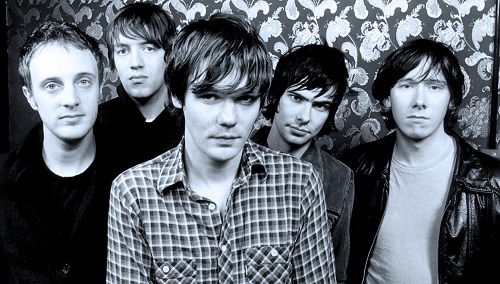 (l to r) Rod Jones, Colin Newton, Roddy Woomble, Gavin Fox, Allan Stewart – Capitol Records press photo Tom Sheehan 2003
(l to r) Rod Jones, Colin Newton, Roddy Woomble, Gavin Fox, Allan Stewart – Capitol Records press photo Tom Sheehan 2003
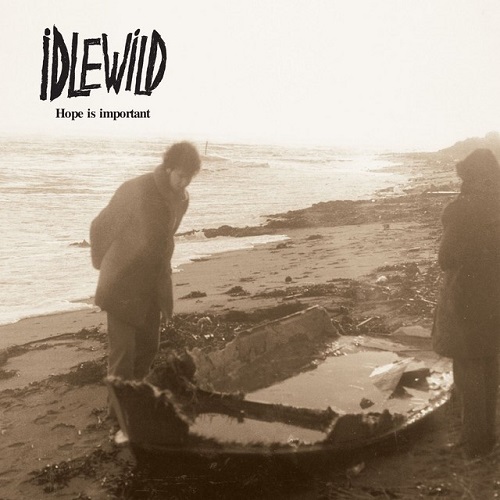
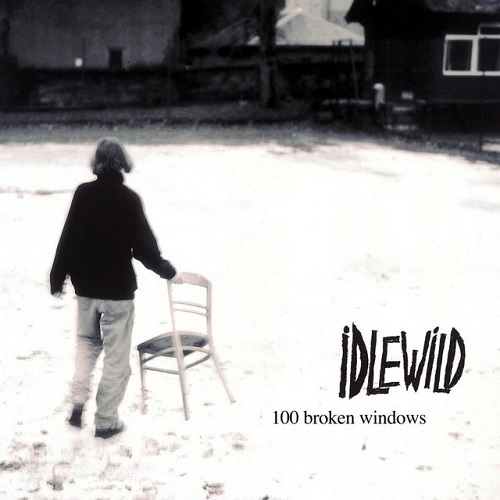
Forming in 1995 at University in Edinburgh, early Idlewild wore their influences on their sleeve. Singer Roddy Woomble has said that he considered putting up a notice in the University Union – “Do you like Black Flag and R.E.M.? Do you want to start a band?” – and although the band, made up of Woomble, Rod Jones (guitar), Colin Newton (drums) and Phil Scanlon (bass) came together without the ad, that collision of punk and melody can always be found in their recordings, even if sometimes one of the traits takes priority over the other.
They started with a couple of indie singles before making the first jump to a major label. The debut single Queen Of The Troubled Teens was released on Human Condition Records in 1997, and Chandelier followed later that year from Fierce Panda. Both of the tracks are now widely available thanks to a rarities compilation A Distant History. By the time of the second single, Scanlon had been replaced on bass by Bob Fairfoull. There’s lots to recommend with these earlier tracks – the youthful punk vigour may be to the fore but its notable that they are already trying to write proper songs. They were never just a noisefest.
The debut EP, Captain, was released by Deceptive Records in 1998. It’s an excellent snapshot of where the band were at the time, with a re-recorded version of early song Self Healer and the first release for Captain, only the second song Roddy wrote with guitarist Rod Jones, and one that’s remained a relatively consistent part of their live set until today. You Just Have To be Who You Are, the closing track from Captain is the first time on record that the band really started to stretch out.
Towards the end of 1998, Idlewild released their first full LP, Hope Is Important, on Food Records. This LP saw the band getting more notice – partly because of the energy of their live set, and partly because of the quality of the material. Three singles from the LP almost reached the Top 40 in 1998 before yet more touring and radio-play helped When I Argue I See Shapes get to number 19 in the fallow weeks of February 1999.
2000 brought 100 Broken Windows, again on Food. Early recordings with Shellac’s Bob Weston suggested that the band might be cranking the volume up to 11, but they subsequently recorded the bulk of the LP with Dave Eringa, notable for producing work by the Manic Street Preachers. This album definitely ironed out some of the punk edges from the band’s songs, but it’s a hugely confident and strong collection that saw them make their first appearance on Top Of The Pops and includes Roseability, for my money one of the greatest singles of the decade.
With their next album, The Remote Part, the band spent some time in the Highlands writing songs before decamping to Rockfield Studios in Wales to record again with Dave Eringa. In “Passing Places”, a journal published twenty years after the release of the album, there’s a piece by Michael Kasparis which says “The sharp edges of their early sound were blown out into a landscaped vision which emphasised emotional outreach, melody, and musical colour.”
Radio-friendly songs like You Held The World In Your Arms and American English saw them reach the Top Ten for the first time, but as the sharp edges were further smoothed, its arguable that the band was at risk of losing some of its identity. Evidence to the contrary was still there – In Remote Part/ Scottish Fiction ended the LP on an elegiac note with swirling guitars and work by Scottish poet Edwin Morgan whilst merchandise on the local tour proclaimed “Support your local poet”.
It definitely felt there was a push and pull between a band that was trying to reach across the Atlantic, and one that wanted to remember its roots. The relentless touring procession reached a head with a fight in Amsterdam that saw Fairfoull exit the band, to be replaced by Alex Grant for the remainder of the tour. Towards the end of the year, Gavin Fox was announced as the permanent new bassist, and Allan Stewart, who had been touring for a while as the band’s second guitarist became a full member.
A couple of years later and 2005 saw the release of Warnings/Promises. This was the last album of their four-album deal with EMI/Parlophone, and the label was looking for this record to take the band to ‘another level’. The whole band were involved in the writing of this LP and the record company encouraged them to record the album with Tony Hoffer at Sunset Sound in Los Angeles. At the start of the year, the band went on a small acoustic tour to introduce the new material but as Woomble notes, “When ‘Love Steals Us From Loneliness’ debuted at number 15 instead of the top ten, and the album went into the charts at number 9 instead of the top five we knew we’d ultimately be facing problems.”
Idlewild had support slots that year with U2 and R.E.M., including a big jamboree at Hyde Park, and the standout tracks from this album hold up well against earlier material. It’s probably not as sure of itself as the earlier ones though and whilst it’s not really the sound of a band on its last legs, it does sound like a band that needs a break for a bit, and they weren’t surprised when the contract with Parlophone wasn’t extended.
The next album, Make Another World, in 2007 saw a move to Sequel Records. Although the album got to number 24 in the UK Charts, it feels overlooked in their catalogue, with little promotion and a record label that met a sticky end that year. Working again with long-time producer Dave Eringa, this LP was heralded as a return to their rockier days, but although a few of the songs have remained in setlists, its muted release probably means it’s destined to remain a curio.
Following the collapse of the label, they crowdfunded the release of their next LP, Post Electric Blues in 2009. Working again with Eringa, they’ve said that releasing the LP themselves and with the support of their fanbase gave them more freedom to explore their songs but the lower budget meant less time to work on it, and though the album felt more upbeat than Make Another World, it didn’t feel as complete as their best work.
In April 2010, Woomble announced that the band would go on hiatus for a period and, after a few more shows later that year, the band did indeed take some time off. Roddy continued to play folk festivals and release a few low-key solo albums. Rod also released a solo album before forming a second band, The Birthday Suit, with which he released a couple of albums through Pledge Music.
When the band returned in 2014, it was after Rod, Roddy and Colin got together to start writing new material, with Andrew Mitchell and Luciano Rossi coming into the fold to replace Stevens and Fox. Another short acoustic tour showed them finding new ways to interpret their own material and revisit lesser-known tracks such as Goodbye (from Warnings/Promises) and Quiet Crown (from 100 Broken Windows), as well as to introduce some of the new work. They genuinely seemed refreshed on that tour, appearing with little expectation and meeting fans afterwards on the merchandise stall, and the new album was produced for the first time by Jones himself. If it’s fair to say they seemed to be worn out last time around, then it’s also fair to say they seemed rejuvenated on Everything Ever Written probably their strongest set of material since the major label days, and on Use It (If You Can Use It) I’m sure there’s a moment halfway through where you can hear them decide to throw the flight of stairs down the flight of stairs, just as the NME suggested they did many years previously.
A Live album followed soon after, capturing the band in ferocious form on home turf, with an additional selection of acoustic tracks showing the variety Idlewild now had. There’s a sequence which blends A Film For The Future into Captain into When I Argue I See Shapes and it’s as good an example you will ever hear as to why this band remains essential even now – I’ve put Captain into the playlist, but go and listen to that triple play and you’ll be a believer.
Their most recent album (to this date), Interview Music, followed in 2019, again on their own label Empty Words. The whole band was involved in the writing of this album and, although it made it into the UK Top 20, it didn’t hang around for long, which is a shame for a strong set of songs that probably merits a second look.
The pandemic got in the way of a 25th Anniversary Tour but when they did play those dates a year later, there was an emotional return for Bob Fairfoull when they played some of the earlier songs.
To mark that 25th Anniversary, Woomble penned an excellent history of the band “In The Beginning There Were Answers”, from which I have borrowed for this piece. At the end of it, he compares the band to an unfinished painting, and says “On the twenty-fifth anniversary of Idlewild, I’m very happy to feel that there are plenty of colours to be added yet.”
Idlewild has just announced dates towards the end of 2025 and fans are wondering if this heralds more new material. In the meantime, it’s a good opportunity to look at their back catalogue, and admire how a young band almost got sucked in and spat out by the music industry but somehow came out the other side as a stronger and far more vital proposition.
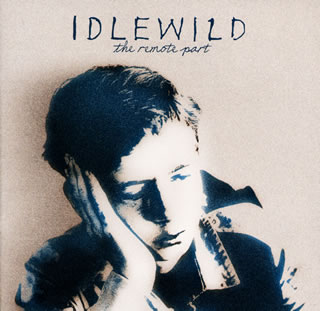
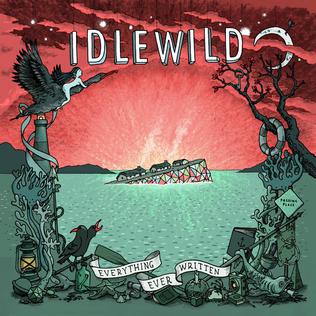
 Idlewild c2020 promo photo Donald Milne
Idlewild c2020 promo photo Donald Milne
Roddy Woomble official website + solo discography
Steve Miller lives in Northampton, where he saw the Pixies in 1988 and still waits for a show to beat that. His intermittent music blog can be found at MillersMixTapes where he also writes about his underwhelming tape collection. Steve can be found on Bluesky shouting at the clouds.
TopperPost #1,147


 Connie Francis
Connie Francis
Idlewild don’t spring to mind when I’m listing my all-time favourite bands, but now that I think about it, I’ve been listening to their music for nearly 20 years now and I think they’re a bigger part of me than I give them credit for. So thanks, Steve – it was nice to read through this piece and learn a bit more about them! I first came across the band in 2005 thanks to that R.E.M. support slot; I haven’t listened to everything they’ve released by any means, but Hope Is Important > 100 Broken Windows > The Remote Part is one of the best three-album runs I can think of, and there are some great moments on the later releases as well. Some of my personal favourite tracks: ‘I’m a Message’ from Hope Is Important, ‘I Don’t Have the Map’ and ‘The Bronze Medal’ from 100 Broken Windows, and ‘Radium Girl’ from Everything Ever Written. Also, I would highly recommend Roddy’s first solo album, My Secret Is My Silence – especially the songs ‘Act IV’ and ‘If I Could Name Any Name’.